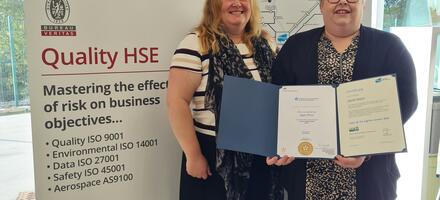
Mastering quality systems
Progress indicator

As part of a series of articles on different quality qualifications, Steve Wilson, a Software Quality Assurance Engineer at Microchip Technology in Germany, describes his experience of achieving an MSc in Quality Management at the University of the West of Scotland.
Q: How did you first hear about quality as a job?
A: During placement drives at college, when I was in the fourth year of my Bachelor’s degree. The advertised roles were mainly as developers or testers – so, quality control. To me, quality is about performing any task – be it in our daily life or a professional setting – with commitment and a sense of ownership.
Quality as a job in a professional setting resonated with me, because it is something that I always liked – to perform a task with commitment. There is always an aspect of continuous improvement associated with quality roles, which makes it more interesting because you are constantly on the lookout to improve the defined processes and frameworks.
Q: What was your first quality role?
A: Software quality tester in quality control, where I performed electric control unit feature tests for automotive clients. My key responsibilities were:
- developing and executing scripts for manual and automated tests;
- creating test plans, test specifications, and summarised test results;
- modifying test specifications according to change requests.
I then moved into the role of quality assurance engineer as an automotive software process improvement and capability determination (Aspice) consultant. In this role, my key responsibilities were:
• mentoring engineering teams to set up processes, methods and tools to be compliant with the quality management system;
- developing and tracking process-improvement plans;
- evaluating project quality status through audits and root-cause analysis;
- training engineering teams on Aspice processes and compliance.
"As a result of my exposure to the various quality domains and best practices used throughout the course, I am able to integrate the learnings in a cross-functional setting and provide a tailored approach to the project teams."
Q: Why did you decide to undertake further learning?
A: To deepen my theoretical and practical understanding of quality systems. I wanted to expand my knowledge on the fundamentals of efficient quality management across various domains and learn industry-relevant quality techniques. This would help me to apply the learning at my job and carry out tasks more efficiently.
Although certification programmes specific to my area of expertise were available, I wanted to supplement the specific competency with a systems thinking or big-picture thinking. This is what led me to take a Master’s degree in quality management.
Q: Why did you choose this course?
A: The MSc Quality Management curriculum was the right mix. I wanted a Master’s in the quality specialisation of management and, at the same time, wanted the course to be generic quality management, not specific to particular topics in quality management, such as food quality, water quality, etc.
Accreditation by the CQI and the Institute of Six Sigma Professionals was testimony to the quality of the course, which made my decision-making easier. In quality assurance, I believe a significant part is to build your interpersonal skills, as you are constantly interacting with the projects teams through audits, process improvements and delivering training. This course focused on those aspects, such as how to manage a change and how to collaborate with various stakeholders, which I believe are key skills for a quality professional.
Q: What objectives and outcomes did you hope to achieve, and has it met your expectations?
A: Yes, it has helped me with various toolkits to become a well-rounded quality professional.
Q: What were the key highlights of what you learned?
A: Group work on case studies was helpful to apply the learnings in a professional setting. Faculty support for job leads and professional body memberships, such as for the CQI, were helpful to become part of the quality community. I was able to land an internship in quality during my last semester because of the careers team lead.
I did additional certification, such as Microsoft Office expert and my Six Sigma yellow belt, and I enjoyed the opportunity to network with alumni and fellow students.
Q: How has this qualification impacted on you and your work?
A: I was able to secure a senior position as Engineer II Software Quality Assurance in Microchip Technology. I believe the technical and interpersonal skills modules from the course have helped me to assist my project teams better. My tool competency has improved and I have a better understanding of quality concepts, which has helped me to interact seamlessly with the project teams and various quality teams in my company.
As a result of my exposure to the various quality domains and best practices used throughout the course, I am able to integrate the learnings in a cross-functional setting and provide a tailored approach to the project teams. Overall, the course has given me a good foundation on which to build my quality career.
Q: What advice would you give others who are considering doing this qualification?
A: This course is ideal for those who want to develop an understanding of the fundamental quality concepts and its application. You should not expect this course to be detail-oriented towards your specific quality domain – for example, automotive quality, aerospace quality – and to its specific standards. However, the generic concepts taught as part of this programme serve as the basis for all quality roles, irrespective of the domain.
Along with technical concepts, it covers management, such as risk management and change management, which provides the essential skills to develop as a well-rounded quality engineer.
I would recommend this course to quality engineers in managerial positions and those looking to take up managerial positions in the future, and to those interested in the technical and non-managerial.
It is a great platform to interact and learn from like-minded quality professionals, and is suitable for beginners and experienced quality professionals alike.
Want to learn more?
Go to the Find a Course section of our website to find a qualification to suit you.
Find this course
Search our database of global Approved Training Partners for this course in a location near you.
CQI Mentoring

The mentoring programme has been designed to support you at different stages of your career.



